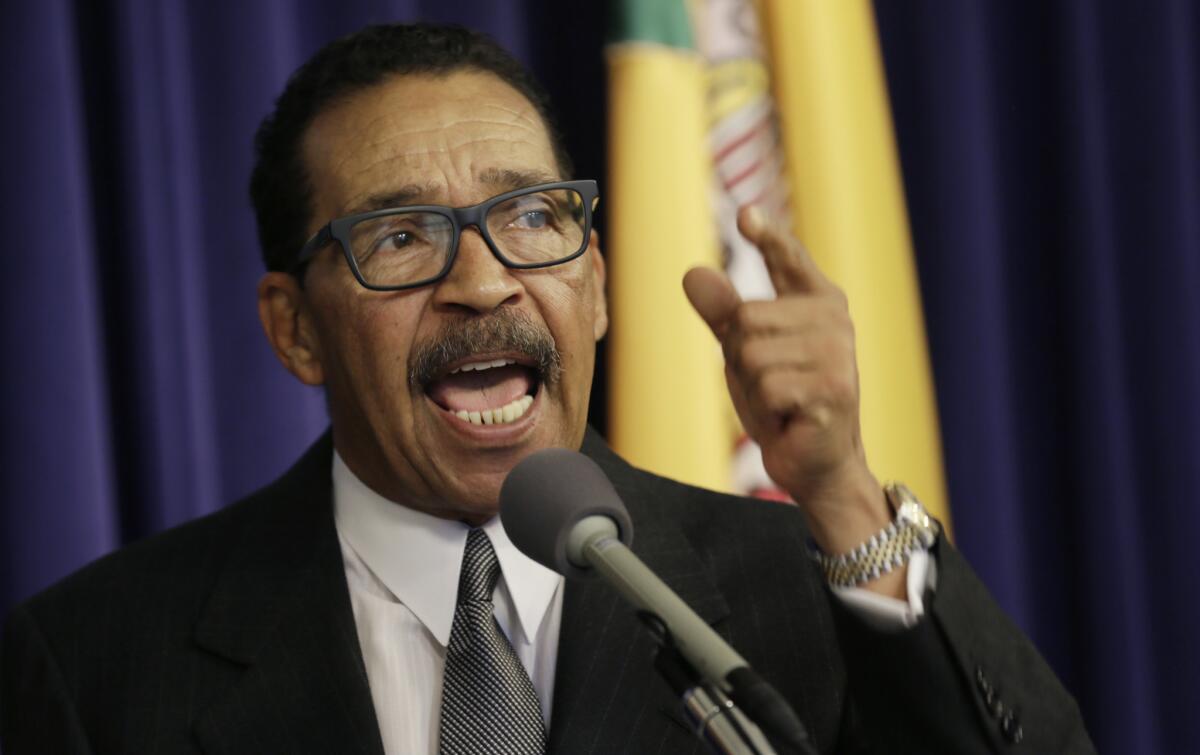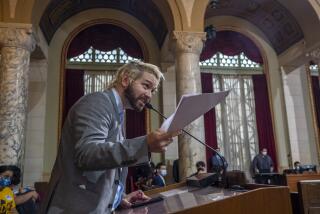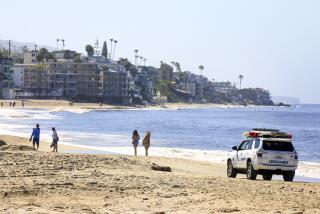No charges for government critic who penned racist comments and images about L.A. City Council member

Prosecutors have declined to file charges against a vocal critic of the Los Angeles City Council who submitted a card during a public meeting with racially incendiary drawings, including a burning cross.
The Los Angeles County district attorney’s office said the card submitted by Encino attorney Wayne Spindler, which labeled City Council President Herb Wesson with a racial slur, was “deeply offensive, morally wrong and socially reprehensible,” according to a memo released Thursday.
But citing 1st Amendment concerns and the “unusual facts” of the case, Dist. Atty. Jackie Lacey’s office ultimately opted against prosecuting Spindler for making a criminal threat against Wesson.
“After much legal analysis and careful consideration, the known evidence appears insufficient to prove beyond a reasonable doubt that Spindler crossed the sometimes nebulous line between constitutionally protected speech and punishable ‘true threat,’” according to the memo.
The card submitted by Spindler on May 11 showed the burning cross and a man hanging from a tree — images typically associated with the Ku Klux Klan — and appeared to depict a KKK figure holding a sign that stated, “Herb = [N-word].” Wesson, who is African American, was presiding over the day’s committee meeting held in Van Nuys.
Two days later, officers arrested Spindler, 46, on suspicion of making threats against Wesson. Community leaders denounced the drawings as a hate crime. And the city’s lawyers obtained a restraining order barring Spindler from coming near Wesson’s home, vehicle or city office, but allowing him to speak at public meetings.
After the decision was announced Thursday, Wesson’s office issued a brief statement.
“We are very disappointed in the district attorney’s determination,” said Wesson spokeswoman Vanessa Rodriguez. “We see Mr. Spindler’s action as morally reprehensible, but we’ll continue our work as public servants.”
Spindler, an attorney who often represents immigrants facing the prospect of deportation, said he welcomed the district attorney’s decision but was critical of her office explaining a legal decision with remarks about his purportedly “reprehensible” behavior.
“That is completely inappropriate for a lawyer making objective analysis,” Spindler said. “They are criticizing me for my public participation. It shouldn’t be there. It’s not part of the law.”
Spindler has maintained that he was being silenced for speaking out against Measure RRR, a ballot measure that sought to reform the scandal-plagued Department of Water and Power. Voters rejected the measure in November.
In an interview, Spindler said the comment card’s burning cross referred to the corruption destroying the city, and he claimed the person hanging from a tree — evocative of lynching — symbolized DWP customers’ suffering from rate hikes.
Wesson said he viewed the comment card as a potential threat to him, his family, city workers and City Hall visitors. He said the comment card recalled the history of racially motivated attacks on the black community.
“It is not OK to do that to me,” Wesson, the first black president of the City Council, said at a news conference shortly after Spindler was arrested. “It is not OK to do that to us in the year 2016. And when I’m talking about us, I’m talking about all of us — white, yellow, black and brown.”
Complaints over Spindler’s behavior were filed with the State Bar of California, the licensing arm of the state’s judicial branch. But the state bar declined earlier this year to have Spindler disciplined or disbarred, in part because the lawyer had not been charged.
The bar “does not agree with the racist implications of Mr. Spindler’s drawing,” deputy trial counsel Ross Viselman wrote in a letter, “but we cannot bring disciplinary charges against him for exercising his right to free speech.”
Spindler said the public condemnation from Wesson and others drew a flurry of personal threats.
“I handed in a speaker card with a stupid doodle,” he said. For that, he claimed to have received death threats and vandalism to his car.
“I had to go into hiding,” he added. “It’s very destructive to my life.”
Shortly after his May arrest, Spindler filed a claim against the city — the first step in a lawsuit proceeding — and alleged violations of civil rights, illegal detention and other charges. He said Thursday that he was still weighing whether to pursue a lawsuit against the city.
Separately, court records show he filed a lawsuit in July against the city over his Nov. 10, 2015, arrest at a police commission meeting.
The city’s attempts to crack down on inflammatory speeches at City Hall has sometimes backfired. In 2014, the city agreed to pay $215,000 to settle a free-speech lawsuit brought by Michael Hunt, an African American man who was tossed out of a city commission meeting for wearing a KKK-like hooded outfit and a T-shirt with a racial slur on it.
Twitter: @MattHjourno
Twitter: @DakotaCDSmith
ALSO
Ex-L.A. County Sheriff Lee Baca’s obstruction trial ends in mistrial; jurors hopelessly deadlocked
Man pleads guilty to killing three people in 2014 Pasadena shooting rampage
Man bludgeoned former reality show contestant to death with hammer, prosecutors say
UPDATES:
9:05 p.m.: This article was updated with additional details on Wayne Spindler’s legal actions involving the city and minor editing.
5 p.m.: This article was updated with additional background on the incident that led to prosecutors to consider filing charges.
This article was originally published at 3:20 p.m.
More to Read
Sign up for Essential California
The most important California stories and recommendations in your inbox every morning.
You may occasionally receive promotional content from the Los Angeles Times.












